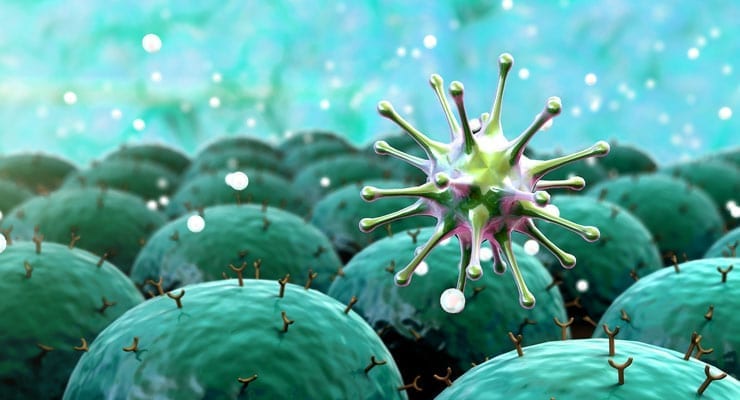The National Institute of Allergy and Infectious Diseases (NIAID) has awarded approximately $5 million in funding for 24 research projects seeking to develop non-traditional therapeutics for bacterial infections to help address the growing health threat of antibiotic resistance.
Increasing resistance to antibiotics coupled with the slow pace of new antibiotic development threatens to erode the past 70 years of progress in fighting life-threatening bacterial infections. The overuse and abuse of antibiotics drives this issue and, as a consequence, bacteria adapt to antibiotics designed to destroy them, making the drugs less effective and allowing antibiotic-resistant strains to survive and multiply.
Non-traditional therapeutics are antibacterial treatment that works differently than traditional antibiotics, such as use of therapeutic bacteria, phage therapy, or decoy targets. The effort supports the goals outlined in the President’s National Action Plan for Combating Antibiotic-Resistant Bacteria.
The 24 phased innovation awards were made to 18 academic institutions and three industrial organizations. The awards provide support for two years with the possibility of three additional years of funding for the most accomplished projects. The recipients are as follows:
- Avidbiotics Corporation: Development of Modified R-Type Bacteriocins to Specifically Target Clostridium Difficile and Prevent Relapse of Clostridium Difficile Infections
- Baylor College of Medicine: Defined Microbial Communities for the Treatment of Recurrent Clostridium Difficile Infection
- Baylor College of Medicine: Bacteriophage to Treat Urinary Tract Infections (UTIs) Caused by Multidrug-Resistant Pseudomonas Aeruginosa
- Brigham and Women’s Hospital: Development of the RNA Molecule-Enriched, Cell Type-Specific Exosomes
- CUBRC Inc: Development of HAMLET as an Adjuvant for the Treatment of Drug-Resistant Staphylococcus Aureus Infections
- Emory University: Polymeric Agents for the Treatment of Clostridium Difficile Infections
- Indiana University – Purdue University at Indianapolis: Development of Anti-Virulence Drugs by Targeting the SaeRS Two-Component System of Staphylococcus Aureus
- Massachusetts General Hospital: Synergistic Photodynamic Therapy for Catheter-Associated Urinary Tract Infections (UTIs)
- Massachusetts Institute of Technology: Engineering “Phagebody” Antimicrobials for Carbapenem-Resistant Enterobacteriaceae
- Medical College of Wisconsin: Bacteriophage to Prevent Infection by Antibiotic-Resistant Enterococci
- Queen’s University at Kingston: Microbes that Matter: Defining Optimal Formulations for Microbial Ecosystem Therapeutics
- The State University of New York at Stony Brook: Small Molecule Inhibition of Pilus Biogenesis by Pathogenic Bacteria
- Synthetic Genomics Vaccines, Inc: Towards the Development of Engineered Phage Therapeutics Against Multidrug-Resistant Pathogens
- Texas A&M Agrilife Research: Development of Therapeutic Bacteriophages against Carbapenemase-Resistant Klebsiella Pneumoniae
- University of Arizona: A Safe, Targeted, Designer Probiotic to Prevent or Treat Clostridium Difficile Infection
- University of California, San Diego: Nanoparticle Decoys for Treating Infections with Enterotoxin-Producing Pathogens
- University of Colorado: Development of Novel Resistance-Modifying Agents for Methicillin-Resistant Staphylococcus Aureus (MRSA)
- University of Colorado: A Novel Screen for Antibacterials that Are Non-Toxic to Mammals
- University of Texas, Austin: Phage Depolymerases as Antibiotics
- University of Texas Health Science Center: Targeting Cell Membrane Adaptation in Multidrug-Resistant Enterococcus Faecium
- University of Texas Medical Branch: Therapeutic Potential of Cystatin 9 Treatment to Fight Bacterial Pneumonia
- University of Sydney: Harnessing Bacteriophages as Natural Predators to Combat the Superbugs: A Pulmonary Drug Delivery Approach
- University of Wisconsin-Madison: Microbial-Ecology Guided Discovery of Non-Traditional Therapeutics that Limit Resistance
- University of Wisconsin-Madison: A Biotherapeutic CRISPR-Delivery Platform to Eradicate Clostridium Difficile
“New strategies are desperately needed to treat patients with antibiotic-resistant infections that often are deadly,” said NIAID Director Anthony S. Fauci, M.D. “These new NIAID grants will provide funding to researchers developing unique, non-traditional therapies that could complement or even replace currently available antibiotics that are losing effectiveness.”



